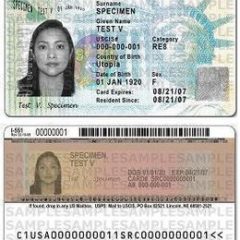USCIS implemented a revised version of the Citizenship Test on December 1, 2020. When Joe Biden became president of the United States, he brought back his old version. And now, as of April 19, 2021, USCIS only offers the 2008 version, regardless of the filing date.

10 important steps in the US naturalization process
First of all, before applying, make sure you meet all the requirements and check if you are eligible for any exceptions.
Step 1. Determine if you are already a US citizen
If you are not a US citizen by birth or did not automatically receive US citizenship from your parents upon birth, proceed to the next step.
Step 2. Determine if you are eligible to become a US citizen
USCIS has a special naturalization eligibility table to help you decide if you are eligible to apply for naturalization.
Step 3. Prepare Form N-400, Application for Naturalization
This form is available for online submission. First, start by creating a free account.
Next, read the instructions for completing Form N-400. Collect the necessary documents to prove your eligibility for naturalization. If you live outside the US, please take 2 photos. Also, check the document checklist – make sure you have collected all the required documents. Avoid these basic mistakes when applying for citizenship.
Step 4. Submit Form N-400 and pay the fees
This form is available for online submission. Moreover, the fees can also be paid online.
When you submit Form N-400, USCIS will notify you of receipt. You can check the processing time and status of your case online.
Step 5. Come to the biometrics test
If you need to submit your biometrics, USCIS will send you an appointment notification that will include the date, time, and location where the biometrics were received. You should arrive at the indicated place at the appointed time.
Step 6. Go through the interview
After all the preliminary processes for your case have been completed, USCIS will schedule an interview for you to complete the naturalization process. You must report to the USCIS office on the date and time specified in the meeting notice. Please bring a meeting notice with you.
Step 7. Get a decision from USCIS
USCIS will send you a Notice of Decision. If you have applied for the N-400 online, you can access the email notification in your account.
- Allowed – Evidence in your documentation confirms that you are eligible for naturalization.
- Continued – USCIS may continue to review your application if you need to provide additional evidence/documentation (in case you did not provide the correct documents to USCIS, did not take the English language or citizenship test the first time).
- Denied – The evidence on your record confirms that you are not eligible for naturalization.
Step 8. Receive notification of your oath-taking
If USCIS approved your application in step 7, you can participate in the naturalization ceremony on the same day as your interview. However, if the same day naturalization ceremony is not available, USCIS will send you a notification with the date, time, and location of the scheduled ceremony. If you have submitted Form N-400 online, you can access the email notification on your application.
Step 9. Take the oath of allegiance to the United States
It is worth noting that you are not a US citizen until you take the Oath of Allegiance during your naturalization ceremony.
- Complete the form N-445, Notice of Oath at Naturalization.
- Come to your naturalization ceremony and register with USCIS. A USCIS officer will review your N-445 responses.
- Hand over your permanent resident card (green card).
- Take the oath of allegiance to become a US citizen.
- Receive your Certificate of Naturalization, review it, and notify USCIS of any errors you find on your certificate before leaving the ceremony.
Step 10. Understanding US Citizenship
Citizenship is a common thread that binds all Americans. Check out this list of some of the most important rights and responsibilities that all citizens (whether American by birth or by choice) must exercise and respect.
Also, do not forget that there is a denaturalization process. Under what circumstances you can be deprived of US citizenship, see the link.






